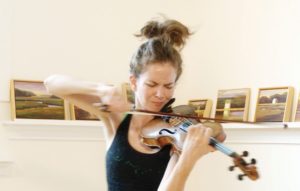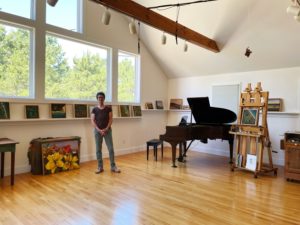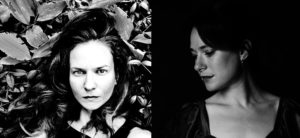On a dirt road in Truro, in a small, weathered house, the atmosphere spins with creative energy, says violinist Roseminna Watson. The house is her aunt Cammie Watson’s studio. Her aunt’s paintings line a low shelf that runs the length of the wall, and an easel stands in the middle of the main room. On it, a small canvas swept with oranges and reds waits for the artist to return. Here in this space, Roseminna will perform a series of concerts this summer titled “Music in the Studio.”

“This studio is intimate, but it’s not a home,” she says. She has played lots of house concerts, but this space feels different to her. “Its sole purpose is art,” she says.
Cammie Watson often paints aerial views of the Outer Cape: shorelines, kettle ponds, small roads, and Route 6, all done in curiously warm blues and greens. The warmth comes from underpainting in red, orange, purple, and pink, says Cammie.
Roseminna’s playing is full of warmth, too. “When Rosey plays in my studio,” says Cammie, “the air, the walls, the whole interior space is enhanced. The art gains a richness and a life.”
Audiences at Watson’s concerts will witness a musical performance far more visual than most. Her playing involves more movement of her entire body than the usual dip and sway of other violinists.
The physicality of Watson’s playing started very early. Her mother, the writer, composer, and violinist Clyde Watson, gave her three-year-old daughter a tiny violin — but instead of teaching her, she let Roseminna experiment with it by herself for a year.
“I was able to allow my physical relationship with the instrument to just arise in me,” says Roseminna. She didn’t ask for help until she turned four. Then, for the next seven years, her mother was her teacher.

“That year alone was the basis for how I continued,” says Watson. “Because of it, practicing and engaging with the instrument and with music has always felt like a laboratory — like a space where I can discover how energy works, how life works.”
Now, at age 40, she says that she experiences music in her body more than ever. “I think of my violin as a portal,” she says. Music travels through that portal into and out of her body. Sometimes, she says, she feels that she and the violin merge. But ultimately, they are distinct.
Through the violin, she says, she has had to relearn “ease” — and, curiously, that has been arduous. “Ease,” she says, means “keeping it light, getting away from ‘push’ energy, ‘have to’ energy, ‘don’t’ energy.” Moving her body, she says, allows her to come into alignment as she plays. If playing the violin is a “huge struggle” in body and mind, she says, then the music won’t happen.
Watson’s teachers have often challenged her way of moving. All through her studies for a master’s degree in violin performance at the State University of New York at Stony Brook and her artist’s diploma in chamber music from the San Francisco Conservatory, teachers tried to make her stay more still while playing, she says. “But my movement is such an innate and natural part of my relationship to the violin, to sound, to vibration.” When she tried to stop, “it always felt like someone was suffocating me.” So, she pushed back.
Watson picks up her violin and begins to play a made-up melody. She has a fierce vibrato and an agile bow arm. The music is in her furrowed eyebrows, her balanced stance, and the tilt of her shoulders. The paintings along the wall provide a sort of contrasting peace. When she brings the violin down, the energy in the room has changed. The room feels alive. Watson looks entirely relaxed.
Watson’s unusual approach to the violin involves another rare talent: she can sing while she plays. One melody comes from her mouth and another from her violin. “It feels really natural,” she says. “It’s not hard at all.” She often composes pieces to be played and sung. “Lullabies for Icarus” is one she’ll play in her concerts this month. In August, she plans to play “Moonbeam Medicine Loop.”
When she sings and plays, she says, it feels as if all the sound is coming from the same place, but one that branches, like a path. “One path is my voice, and one is my instrument,” she says.

For the first two concerts in this summer’s Music in the Studio series, Watson will perform with pianist Melody Fader, a soloist, chamber musician, and vocal and dance accompanist. Fader is a pianist for the Dance Theater of Harlem and the New York Theater Ballet among other companies and is the founder of the Melody and Company Chamber Series ensemble. Watson and Fader will present solo and duo works for violin and piano by Debussy, Mozart, Biber, and Chopin, and by Watson herself.
Watson says her favorite part of performing for others is the feeling of traveling to “a place that I can’t get to by myself, and neither can the audience,” she says. “It’s a weightless, ‘everything is worth it’ feeling I have not experienced in any other way.”
Music That Moves
The event: Music in the Studio: Violinist Roseminna Watson and pianist Melody Fader
The time: Thursday and Friday, July 21 and 22, 7:30 p.m.
The place: Cammie Watson Studio, 6 Swale Way, Truro
The cost: $20+ suggested donation; tickets at roseminnawatson.com. Limited to 30 people; masks required.



